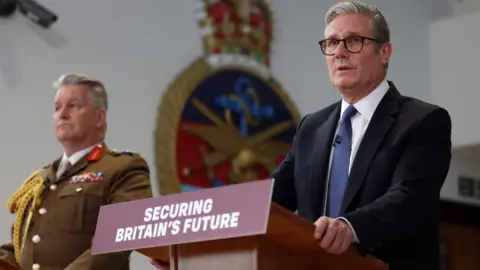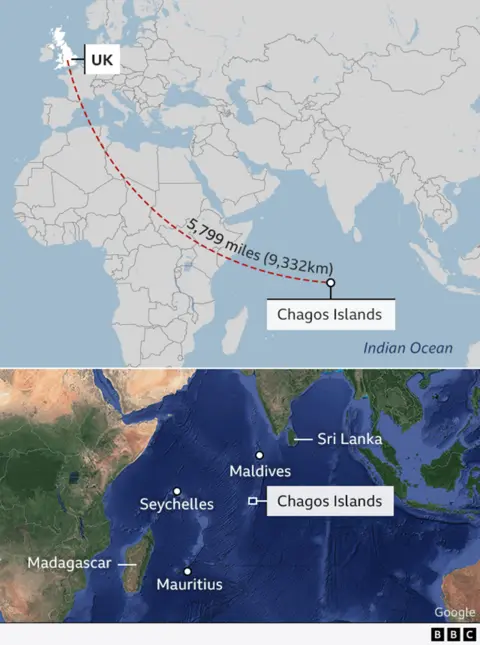
 EPA
EPA
In a fast-moving world, suffused by conflict and political uncertainty, it might seem odd for the UK government to surrender sovereign British territory in a distant sea.
Indeed, the government's critics go further and say the decision to give up a key strategic foothold in the Indian Ocean is a dangerous weakening of UK security.
So why has the government handed the Chagos Islands to Mauritius, a nation some thousand miles away?
The answer has a legal origin and a practical conclusion.
It all focuses on the joint UK-US military base on the biggest island in the archipelago, Diego Garcia.
The government felt that without ceding sovereignty to Mauritius, the operation of the base would become unworkable and that would pose a greater threat to UK security.
Defence Secretary John Healey told MPs that "without this deal, within weeks, we could face losing legal rulings and within just a few years the base would become inoperable".
The putative legal challenge is based on a series of judgements by various United Nations bodies that the Chagos Islands belong to Mauritius.
Essentially, they argued the UK had no legal right to separate the islands from Mauritius before the former British colony became independent in the 1960s.
There were votes to that effect in the UN General Assembly.
But then in 2019 there was an "advisory opinion" by the UN's International Court of Justice backed up by a later ruling of the Special Chamber of the International Tribunal for the Law of the Sea.
Ministers feared these rulings and opinions would soon become a legally binding judgement by this UN tribunal.
Under pressure in the House of Commons to identify the source of this legal threat, Healey said: "There's a range of international legal challenges and rulings against us.
"The most proximate, the most potentially serious, is the tribunal of the International Convention of the Sea."
If the government lost a case there, ministers argue, the outside world would be obliged - by law - to take decisions that would interfere in the running of the base.


So they argue Diego Garcia's satellite communications would be threatened because the UK relies on a UN authority in Geneva to get access to a particular electromagnetic spectrum.
They say contractors would refuse to visit the isolated base - to make repairs or deliver supplies - for fear of being sued by Mauritius.
The ability to fly aircraft in and out might be challenged by international rules that govern our skies.
The government's critics – which include Conservative and Reform MPs, some foreign diplomats and even a few officials within Whitehall – challenge this argument and say the legal threat is being exaggerated.
They accuse ministers of being overly submissive to international lawyers and craven to politically motivated votes at the UN.
Shadow defence secretary James Cartlidge told MPs the government was "following the legal advice to act definitively to our detriment, entirely on the basis of hypothetical risk that has not yet materialised and which we could challenge".
Blocking bases
The government's second argument is that without a deal, China would get a toehold in the islands.
Officials say that in the absence of an agreement, there would be no legal ban preventing Mauritius allowing a foreign power to establish a military or other presence in the islands.
Under the terms of the deal, the UK can effectively veto that happening.
The UK claims that without the deal, it would have no alternative but to threaten military force if China tried to set up a military facility on one of the islands.
Officials also argue that Mauritius, by being paid rent for the islands, has no financial incentive to open them up to Chinese investment.
The government's critics counter that for all these safeguards, the Mauritian government may well nonetheless still develop closer ties with China – and possibly even Russia.
Reputation on trial
The government's broader argument is diplomatic.
For years the UK has been accused by friend and foe alike of hypocrisy; for making the case for international law on the world stage but ignoring it with regard to the Chagos islands.
How could the UK criticise Russia for breaking international law in Ukraine and China in the South China Sea if it was itself breaking the rules in the Indian Ocean?
Ministers also argued that at a time of geopolitical uncertainty, when old allies were less reliable and new partnerships had to be formed, the Chagos row was a diplomatic boil than needed to be lanced.
It was notable the UN Secretary General Antonio Guterres issued a statement welcoming the deal, saying it demonstrated "the value of diplomacy in addressing historical grievances".
Again, the government's critics dispute this conclusion, arguing the world has changed, and that we live in a time when "might is right" and close adherence to the fine print of international law is outdated and a geopolitical indulgence.
Would US President Donald Trump or French President Emmanuel Macron, they ask, give up territories overseas?
The government's response to that challenge is to say that the US - which largely runs and pays for Diego Garcia - now supports the deal with Mauritius, despite earlier doubts.
US Secretary of State Marco Rubio said "following a comprehensive inter-agency review, the Trump Administration determined that this agreement secures the long-term, stable, and effective operation of the joint US-UK military facility at Diego Garcia".
Other members of the Five Eyes intelligence alliance also back the agreement; the base is a huge hub for the exchange of global signals intelligence.
These issues will now be tested in Parliament as MPs consider whether to ratify the agreement.
The government may win the vote because of its majority.
But it has yet to win the argument.


.png)
 7 months ago
30
7 months ago
30








 English (US) ·
English (US) ·